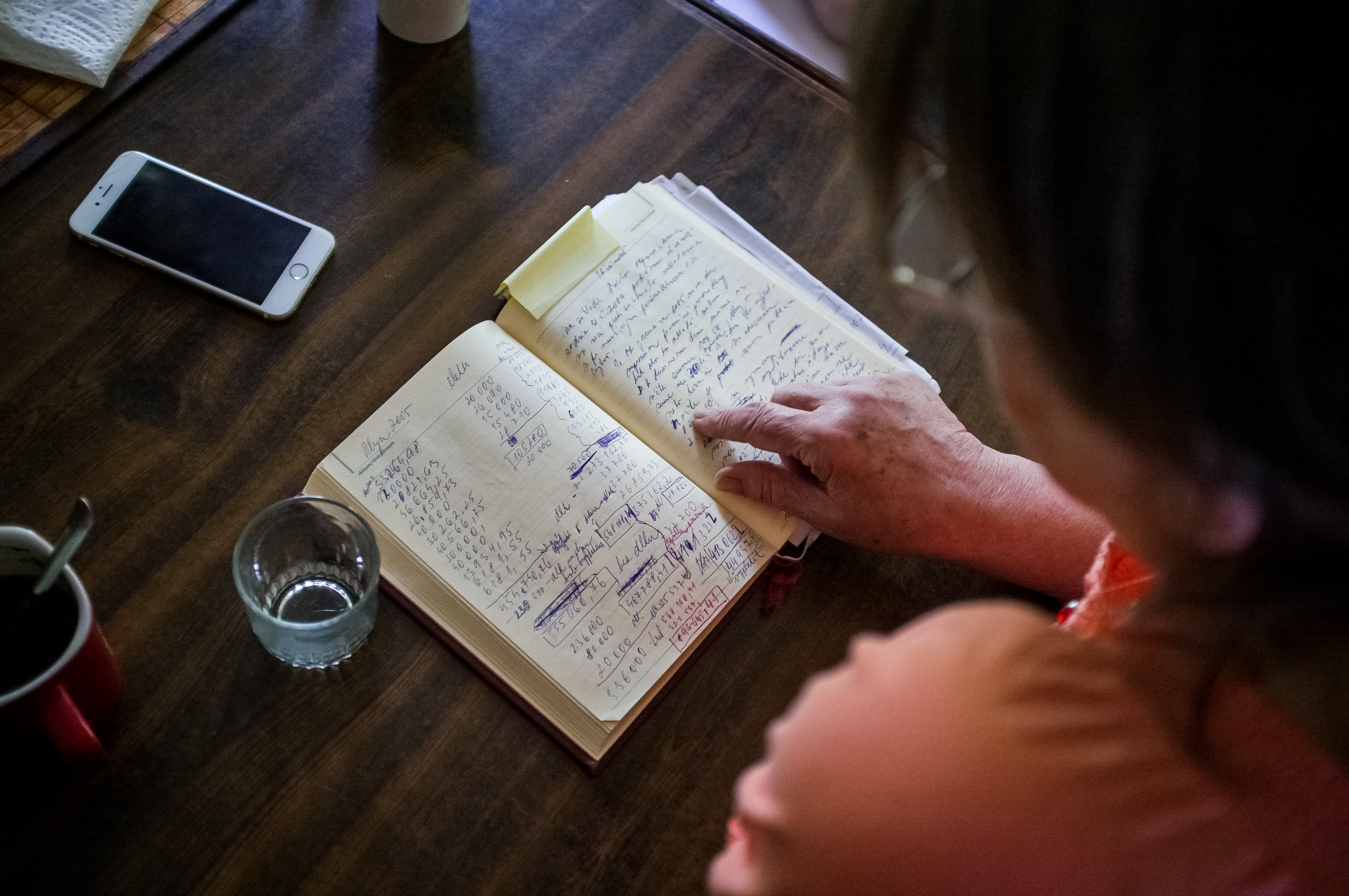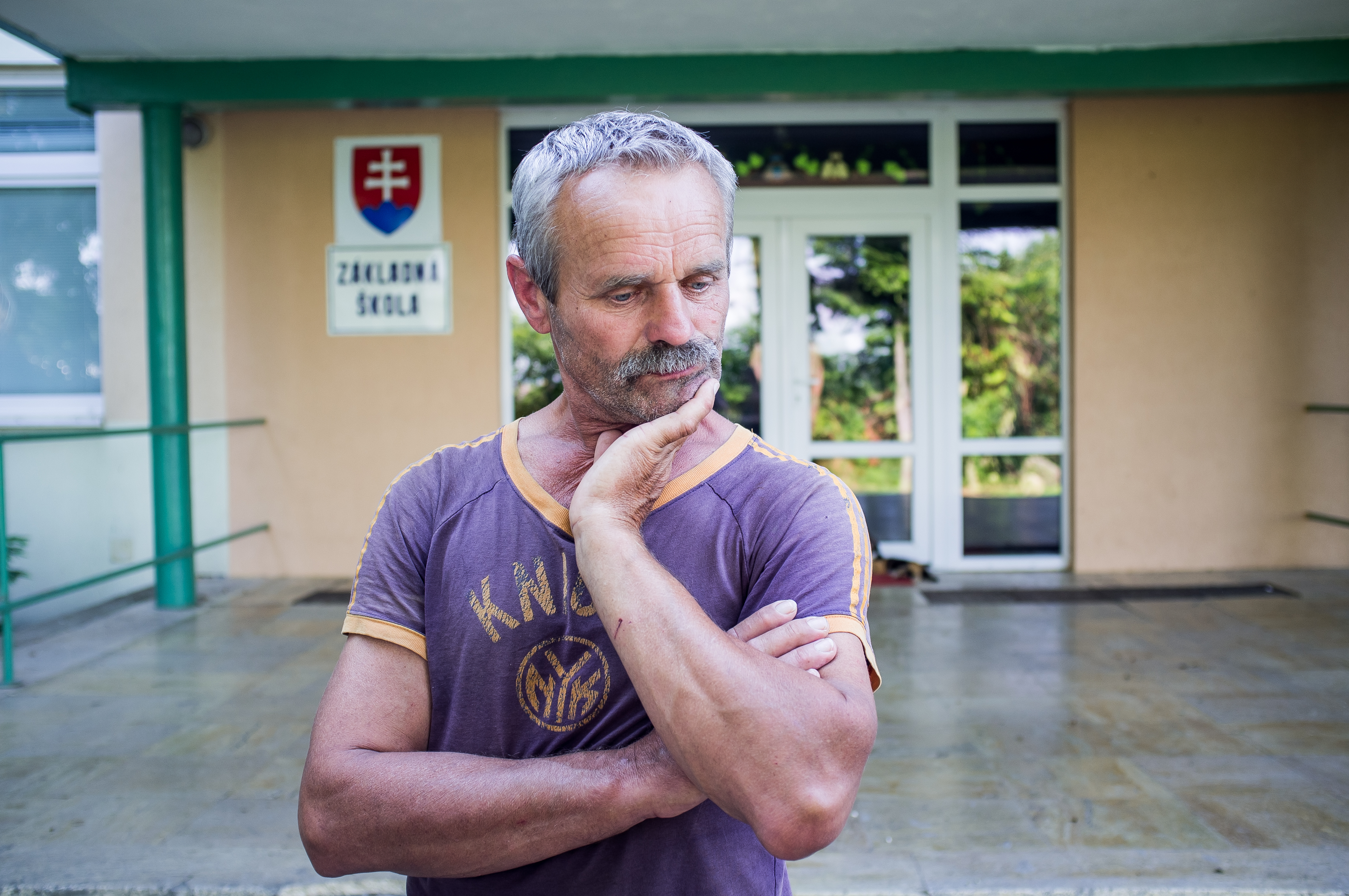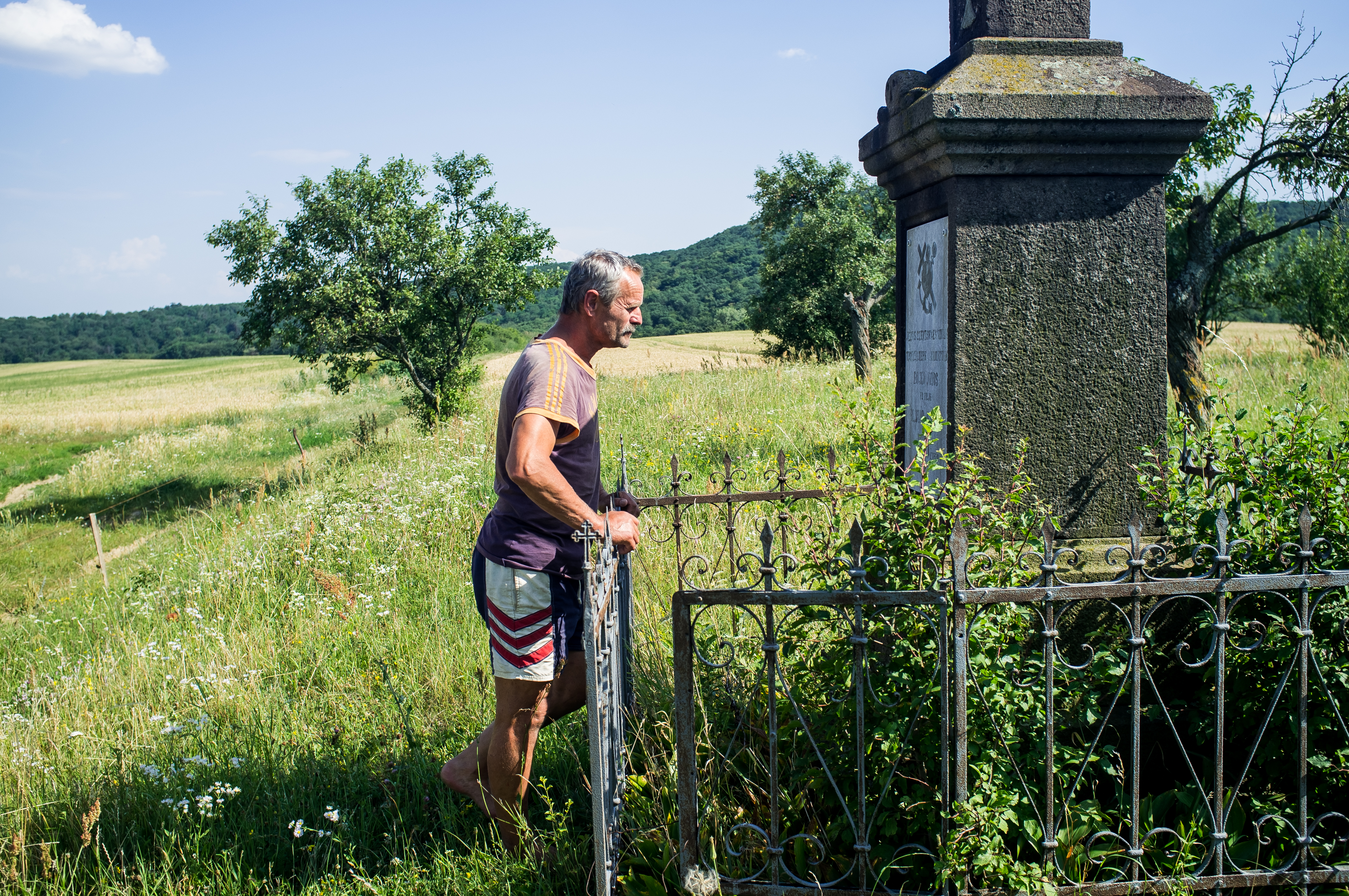23 January 2019
Originally published
01 September 2018
Source
Visitors to Cejkov are met by an idyllic scene. The village in eastern Slovakia, not far from the Hungarian border, is just one hour east of Košice by train, surrounded by vineyards, sprawling fields and gently undulating hills. The Bojko family farm is located at the end of a dusty gravel road: an attractive little estate with balustrades made out of dark wood and walls of thick stone; a small farm with eight cows and half a dozen chickens. Straight out of a picture book.
Sixty-year-old Alžbeta Bojková is in the parlour handing out fresh, raw milk from the shed. Thick ribbon noodles are cooking away in the pot, which will be served up with homemade curd cheese. Steam fills the kitchen. “The village is sick,” says Alžbeta as she gives the noodles a good stir. “How can I be sure they won’t shoot me now, like that Kuciak, if I talk to you about all of this?”
About the corruption in the village, the cuts to wages and the threats at the village school where Alžbeta and her husband Ján are teachers. About the long-standing battle with the mayor and the head teacher.
On 25 February 2018 the investigative journalist Ján Kuciak and his fiancée Martina Kušnírová were found dead in a house in western Slovakia. They were murdered with three shots; two to the chest of the young man and one to the head of the woman. Kuciak, who was just 27 years old, had been researching ties between the Italian mafia and the highest-ranking Slovak government officials at the time of his death. There is little doubt that his brutal execution was related to his work as a journalist. The case thus sent shockwaves throughout Slovakia and prompted tens of thousands of people to take to the streets in protest; one day the demonstrations were even larger than during the Velvet Revolution in 1989.
Many Slovaks are all too familiar with the system of intimidation and threats that Kuciak came up against before he was murdered.
Many Slovaks are all too familiar with the system of intimidation and threats that Kuciak came up against before he was murdered. They can no longer turn a blind eye, and nor do they want to. This is also why Alžbeta Bojková is telling her story – despite her fear of reprisals. It is back in 2004 when she first notices irregularities in the cash flow at her school. As a member of the local council, she is comparing the funding that the Ministry of Education has allocated to the local school for 6 to 15-year-olds with the amount that has actually ended up in the school coffers. Schools in Slovakia are self-governed, so the state transfers the funding for the school directly to the municipality. The school, however, receives less than the earmarked sum. This is above all the case with the teachers’ bonuses, which are missing altogether. She cannot say for sure exactly where the money has ended up – but the funds seem to be seeping away somewhere between the accounts of the municipality and the school.
When Alžbeta goes public with the allegations and confronts the mayor, who is responsible for keeping an eye on the budget, at first nothing happens at all. She then contacts more high-level authorities, such as the Ministry of Education and the Ministry of Internal Affairs. Again, nothing happens. This continues for several years. Each year, Alžbeta meticulously details the missing amounts in small, red leather booklets, which she stores away in her cupboard. She adds up the sums, her fingers darting across the tables: over all these years, the teachers have been cheated out of some 150,000 euros, she estimates. When their salaries are cut completely for three months, she finally goes to the press. The year is 2009 and a Slovak news site reports on the case. But yet again, nothing happens.
On the contrary: life in the village becomes more and more unpleasant for the Bojkos. It starts with low-level harassment. Their sons are no longer allowed to play on the football pitch, the father is not allowed to park in the teachers’ carpark. When their daughter Betka, a historian who lectures at the university in Košice, is asked to be a last-minute substitute for a sick teacher at the local school, the mayor blocks her appointment. Teachers who complain about the conditions at the school and go on strike are put under pressure. The head teacher, who also points out the incorrect payments, is ultimately replaced by a loyal principal. “A puppet whose strings are pulled by the mayor,” as one teacher later refers to him in a television report. “This is not true,” the head teacher says at the time, but with him at the helm, Alžbeta soon sees her history lessons cancelled and is ordered to scrub the corridor. When she refuses, she is fired.
For the Bojkos the life in the village became more and more unpleasant.
The Bojkos are offered words of encouragement in hushed tones, but no one speaks up for them on the record. Not even the teachers, who are directly affected by the missing payments. Money that would certainly come in handy: with a starting salary of around 500 euros a month, Slovakia is one of the bottom payers when it comes to teachers’ wages. However, the mayor has opted for a currency which is tougher than any bonus: people’s fear of losing their jobs. Even though Alžbeta fights tooth and nail at an industrial tribunal and manages to get her teaching position back, the people in the village have already learned their lesson: stay quiet or you will fare as badly as the Bojkos.

Alžbeta’s mother kept a diary with accounts of irregularities at school and all events that happened to the Bojko family. Photo: © Dávid Hanko
The mayor of Cejkov is a member of the powerful Social Democratic party Smer, which also boasts the prime minister among its ranks. The Bojkos presume that he has managed to exert his influence on the institutions on numerous occasions. Alžbeta and Ján’s daughter Betka, who has made her parents’ battle her own, cites an example from 2016: when six of the Bojkos’ teaching colleagues finally dared to take their grievances about the harassment they were facing to the Slovak National Centre for Human Rights, their complaints were not even processed. Because the mayor himself had intervened, as the director of the institute later admitted in a private conversation with Betka.
The Bojkos frequently clash with the mayor, who has governed the municipality for over 15 years. The situation reached a head one day some ten years ago. “We’ll have you all shot, your entire family.” Betka’s father swears that these were the words uttered by the mayor during a disagreement under the influence of a substantial amount of alcohol. “And you’ll be first in line!” For a long time, these words went round and round the back of Betka’s mind. Since the double murder of Kuciak and his fiancée, once again they are loud and clear. “I’ve got my sights set on your mother, your father and your brothers and sisters,” a powerful businessman allegedly said to Ján Kuciak, a few months before the journalist died. “But you’ll be first in line.” Kuciak had been investigating the businessman. The anger felt by the Bojkos is therefore now mixed with a sense of fear. “This threat used to be abstract,” says Betka. “Since Kuciak’s murder, it become very real.”
„This threat used to be abstract, but since Kuciak´s murder it became very real.“
The Bojkos are certainly not without their sympathizers. Since Betka was recently sent packing at the Košice Labour Inspectorate – on the grounds that they couldn’t identify any misdemeanour on the part of the school and the municipality – an employee at the agency has been leaking internal documents to her. One such document is the e-mail correspondence between a head of department and an employee who Betka has complained about to the head. It reveals why the case has not been pursued any further – and how one hand washes the other at the agency. “So that’s the thanks I get for always taking on the most difficult cases and solving things our way?” writes the employee to the department head. “I was always there for you, wasn’t I? Is that all so easily forgotten?”
One could write it all off as a personal feud between the mayor of Cejkov and the Bojkos. However, the case in the 1,200-strong village, where jobs have been few and far between since the closure of the communist collective farms and where the school and the municipality are the main employers, created such a stir that Slovak television even travelled 400 kilometres from Bratislava to report on it two years ago. None of that changed a thing, sighs the mother. “I don’t understand,” she says. “Why do we have institutions if they don’t even function properly?” As far as the Bojkos are concerned, their story exemplifies the state of Slovak society. The other side – the local politicians and representatives of the people – doggedly refuse to say a word on the matter: despite numerous written and telephone inquiries, no one at the municipal offices was prepared to make a statement.
This story is typical for the state of the Slovak society.
The Bojkos have become more and more isolated in the village over the years. As Betka strolls through the village today, passing by the stooped houses, the six chapels and the crosses decorating the walls of the houses, she calls out a cheery “ahoj” over each of the colourful wooden fences. Not all of the inhabitants greet her back. “We’re the rebels in this village,” says Betka, shrugging her shoulders, as she walks through the settlement with her father, who is barefoot. “The Bojkos don’t belong in this village,” the mayor is reported to have said. Is it merely a coincidence that the municipal road stops a long way short of the Bojkos’ farm and that there is no well-lit asphalt road leading up to it? The family have stopped going to pray in the village church like all the other residents. Instead, they go to the stone cross erected by their ancestors on a hill, from where, on a clear day, you can see as far as Ukraine. “I think they’re wondering why we aren’t scared,” says Betka. “And we’re also wondering what’s up with them.” While they wonder, they like to recount the family legend: as far back as the Thirty Years’ War, the Bojkos’ ancestors fought against the Kaiser; when Soviet soldiers marched in to crush Prague Spring, Betka’s mother, who was just ten at the time, painted a placard in protest. “Resistance is in the blood,” she says with a mixture of pride and defiance. Joining the demonstrations after Kuciak’s murder is therefore the most natural thing in the world for 33-year-old Betka. It is not long before a wave of opposition emerges in Košice either. Only a few weeks after Kuciak’s murder, a group of people gather in the city centre on a wet and cold Friday evening in March. Holding memorial candles to symbolise their mourning and rattling bunches of keys to symbolise their anger.

Ján Bojko in front of the elementary school in Cejkov. Photo: © Dávid Hanko
Behind the scenes, the organisers are still desperately looking for speakers. An activist is trying to persuade Betka to go on stage. But she shakes her head of long, blonde hair. “A priest and an actor who gave speeches during the Velvet Revolution are on the stage,” she answers. “What have I got to say to the people?” “You’re plucky, you’re good with words and you’re a woman,” counters a fellow activist. “We need you.” Rain is beating down on the roof of the tent and the crowd have pulled the hoods of their anoraks and winter coats down over their faces as Betka approaches the microphone. She casts her eyes downwards and hesitates. For one, two, three seconds. The crowd spur her on. She holds back the tears and starts to speak. As the minutes go by, she gradually speaks faster and with ever greater conviction. She talks about corruption and the feud in the village on the Hungarian-Slovak border where her parents live. And about the dispute between the village mayor and her father which escalated one day and ended in the words: “I’ll shoot your whole family, and you’ll be first in line!” The crowd clamour as her words shoot through the night sky. Her speech is later uploaded onto YouTube and broadcast on television.
Joining the demonstrations after Kuciak’s murder is therefore the most natural thing in the world for 33-year-old Betka.
The tale from the village of Cejkov is thus a lesson on the workings of corruption in Slovakia: a microcosm of power abuses, networks, intimidation and ignorance. A system in which one hand washes the other and where everyone turns a blind eye when push comes to shove. “Nie je nám to jedno,” “It does matter to us,” becomes one of the slogans of the protest movement. This sentiment was clearly shared by President Andrej Kiska when he used unusually dramatic words to express his dismay at the journalist’s death: “There’s something rotten in the very foundations of our state.”
At the same time, Slovakia was viewed until recently as a pillar of stability in Eastern Europe. The country with 5.4 million inhabitants is the smallest state in the Visegrád group and was the second country in the former Eastern Bloc after Lithuania to introduce the euro in 2009. The global automobile industry has invested so much in the country that Slovakia is now the world’s largest car manufacturer pro capita. Social Democrat Robert Fico was viewed in Brussels as a moderate and respectable prime minister surrounded by states governed by illiberal and populist forces. However, the problems of corruption and nepotism went undetected across the globe for many years. And when Fico recently dismissed the protests as a plot organised by foreign powers, his rhetoric was all too reminiscent of Viktor Orbán’s.
„The problem in Slovakia are not the institutions, but the political culture.“
Perhaps it was precisely this gulf between the way the country viewed itself and the deep chasm into which the Slovaks peered after the journalist’s murder that gave the protests such momentum. The need for a country governed by the rule of law and for a “respectable Slovakia” came up again and again in activists’ speeches, as well as anger about conditions that Slovaks thought were a thing of the past, but which continue to have an impact.
The protests die down over the summer, but pick up again in the autumn. In Bratislava the Social Democratic party Smer is still in power, while the former prime minister Robert Fico pulls the strings in the background. The murder of Kuciak and Kušnírová is still far from solved. In the meantime, more and more scandals are coming to light. Such as the recent case surrounding the former Vietnamese politician Trịnh Xuân Thanh, who, according to German investigators, was smuggled via Bratislava to Vietnam with the assistance of the Slovak Interior Ministry.

Ján Bojko next to the memorial for the brother of his great-grandfather. Janos Bojko died in World War I. Photo: © Dávid Hanko
The old rules still apply in the village, too. Betka’s suspicion that there was something not quite right about the appointment of the new head teacher was confirmed once and for all by the Ministry of Education. A fact which the mayor nevertheless chooses to ignore. Villages in Slovakia are self-governing, which means the Ministry of Education has no authority to issue directives to the municipality. “The problem in Slovakia are not the institutions,” says Gabriel Sipos, head of Transparency International in Slovakia, “it’s the political culture.” Betka has since turned to the department of public prosecution. It’s a gruelling battle, but she will not give up. “Even if it means chaining myself to the gates of the school!” she says. Betka and the other activists have differing ideas about what shape the protests should take in future. Is it really necessary to demand big gestures, such as the resignation of the prime minister or the minister of internal affairs? Concessions that are ultimately cosmetic, because the system continues to function according to the old rules and the old networks remain firmly in place. Betka believes that small steps could spark big changes in the political culture. At any rate, having a decent head teacher or mayor is just as important as having a decent minister of internal affairs or prime minister.
If wrongdoing starts off on a small scale, then perhaps the battle against it needs to start off with the small things, says Betka. This requires courage, however. When an employee from the authorities recently slipped her a few documents about the abuses going on there, Betka was happy to receive some support. At the same time, she was annoyed. “This woman could have gone public with these documents herself,” she says. What is stopping her from doing so?
Original in German. Text by the author on the subject was published in September 2018 in Austrian monthly DATUM.
Translated into English by Rebekah Smith.
This text is protected by copyright: © Simone Brunner. If you are interested in republication, please contact the editorial team.
Copyright information on pictures, graphics and videos are noted directly at the illustrations. Cover picture: Ján and Alžbeta Bojko near the family memorial behind their house. Photo: © Dávid Hanko.